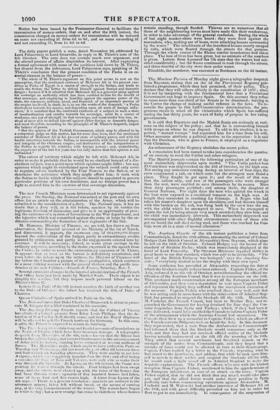The daily papers publish a note, dated November 2d, addressed
by Lord Palmerston to Lord Granville, in reply to M. Thiers's note of the 8th October. The note does not contain much new argument, and the altered posture of affairs diminishes its interest. After expressing a formal agreement with some of the positions laid down by M. niers, but dissent from the inferences, Lord Palmerston says, speaking of M. Thiers's conclusion that the present condition of the Pasha is an es- sential element in the balance of power-
" The whole of M. Thiers's argument on this point seems to rest on the assumption, that the continued existence of Mehemet Ali in his present con- dition as Pasha of Egypt is a source of strength to the Sultan, and tends to enable the Sultan the better to defend himself against foreign and domestic danger ; because if it is admitted that Mehemet All is a governor using against his sovereign an authority which has been confided to him for the benefit of that sovereign, and employing in hostility against the supreme power of the state, the resources, military, naval, and financial, of an important portion of the empire itself—if, in short, he is, to use the words of the despatch, a Pasha disobedient towards his master, and depending upon all sorts of foreign influ- ences,' it is manifest that the continued existence of a subject in such a state of insubordination and enmity towards his sovereign, must be a source of weakness, and not of strength to that sovereign, and must render him less, in- stead of more able to defend himself against either foreign or domestic danger, and must therefore, according to the principle's of M. Thiers's despatch, impair the balance of power.
4, But the opinion of the Turkish Government, which may be allowed to be a competent judge on this matter, has fur some thou been, that the continued existence of Mehemet Ali in his present state of military power, and with his hostile intentions towards the Sultan, is incompatible with the internal peace and integrity of the Ottoman empire, and destructive of the independence of the Sultan as regards his relations with foreign powers : and, undoubtedly, the experience of the last few years has too fully shown that this opinion is not unfounded."
The extent of territory which might be left with Mehemet Ali, in order to make it probable that he would be an obedient instead of a dis- obedient subject, was a point upon which opinions might differ ; but any opinions which might be entertained upon the subject could only serve to regulate advice tendered by the Four Powers to the Sultan, or to determine the assistance which they might afford him : it rests with the Sultan to decide which of his subjects should be appointed to govern particular portions of his own dominions, and no foreign power has a right to control him in the exercise of that sovereign discretion.


























 Previous page
Previous page